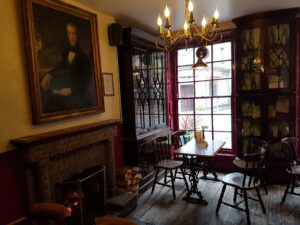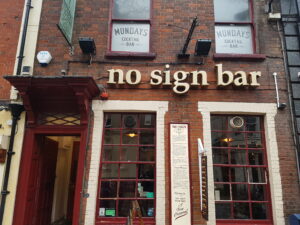Nobody followed me to the No Sign Bar, Swansea – a regular haunt of Dylan Thomas. Seated next to the window, I searched inside my handbag for Collected Stories by Dylan Thomas. I found The Followers, a ghost story, hidden inside the anthology.
A ping from my phone confirmed a signal, but I ignored the emails. I sat in the bar Thomas renamed the Wine Vaults. I read the opening lines of the story, but there was no sign of the beer I had just ordered. Without anything to quench my thirst, there was nothing I could do apart from read on. Between words, I felt compelled to search for two pairs of eyes outside of the window, but there was no sign of anyone.
 Outside the window, ‘the rain spat and drizzled past the street lamps’. No one wore ‘squeaking galoshes, with mackintosh collars up and bowlers and trilbies’. Alas, the ‘rattle of bony trams’ was silenced long ago. Only the swish of car tyres, hum of engines and slamming of car doors filled the silence on the streets. Gazing at the decaying red window frames, I did not see ‘a young man with his arm around a girl’. Instead, I glimpsed a young couple hand in hand dashing across the road while there was a break in the traffic. Outside, there was a mass of coloured jackets and everyone wore jeans, leggings or trousers. No one looked inside the tatty building. They didn’t seem to care that Dylan Thomas once frequented this watering hole.
Outside the window, ‘the rain spat and drizzled past the street lamps’. No one wore ‘squeaking galoshes, with mackintosh collars up and bowlers and trilbies’. Alas, the ‘rattle of bony trams’ was silenced long ago. Only the swish of car tyres, hum of engines and slamming of car doors filled the silence on the streets. Gazing at the decaying red window frames, I did not see ‘a young man with his arm around a girl’. Instead, I glimpsed a young couple hand in hand dashing across the road while there was a break in the traffic. Outside, there was a mass of coloured jackets and everyone wore jeans, leggings or trousers. No one looked inside the tatty building. They didn’t seem to care that Dylan Thomas once frequented this watering hole.
Reading the short story, I pursued the followers, as they scurried through the alley. Inside, No Sign Bar, I could smell the old musty wine cellar. No one was responsible for the spontaneous spark of colour in the open fire. The pitted floorboards had been battered by tired and drunken feet for centuries. Words echoed around cavernous room. Perhaps, these were the words that inspired Dylan Thomas’s story The Followers: his only ghost story. And I heard the rise and fall of the Welsh accent that probably escaped into the pages of Thomas’s mind, as he imagined the story. I read the final sentence, ‘And we went our separate ways.’ I departed.
 Near to Paradise Alley, I heard a voice echo. ‘Spare some change, madam?’ The homeless soul was clutching a fleece blanket. His watery, bloodshot eyes regarded me as he rolled himself a cigarette. I spared him fifty pence, but this wouldn’t even buy him a beer. He caught the meagre offering with a grateful nod that punched my conscience.
Near to Paradise Alley, I heard a voice echo. ‘Spare some change, madam?’ The homeless soul was clutching a fleece blanket. His watery, bloodshot eyes regarded me as he rolled himself a cigarette. I spared him fifty pence, but this wouldn’t even buy him a beer. He caught the meagre offering with a grateful nod that punched my conscience.
‘Have you seen Leslie?’ mumbled the man. He looked at my handbag as I retrieved more change.I nodded. ‘Only bread and jam in my handbag,’ I declared.
I ran to the car park. The rain drizzled until diluted my memory of the bar. I heard the distance tapping of footsteps and turned around. Thankfully, there was no sign of anyone following me. Checking Twitter, I did note I had two more followers.
No Sign Bar and The Followers
No Sign Bar is believed to be Swansea’s oldest pub and dates to 1690. The wine cellars date back to the 15th century. The name ‘No Sign’ originates from legislation of licencing when public bars had to have a recognisable sign. This building was not public house and did not require a sign, hence was later given the name ‘No Sign’ to announce its presence!
Dylan Thomas frequented No Sign Bar, as a young man. No Sign Bar is featured as the Wine Vaults in Dylan Thomas’s story, The Followers. Salubrious Passage, next to the bar, is referred to as Paradise Alley in the short story.

